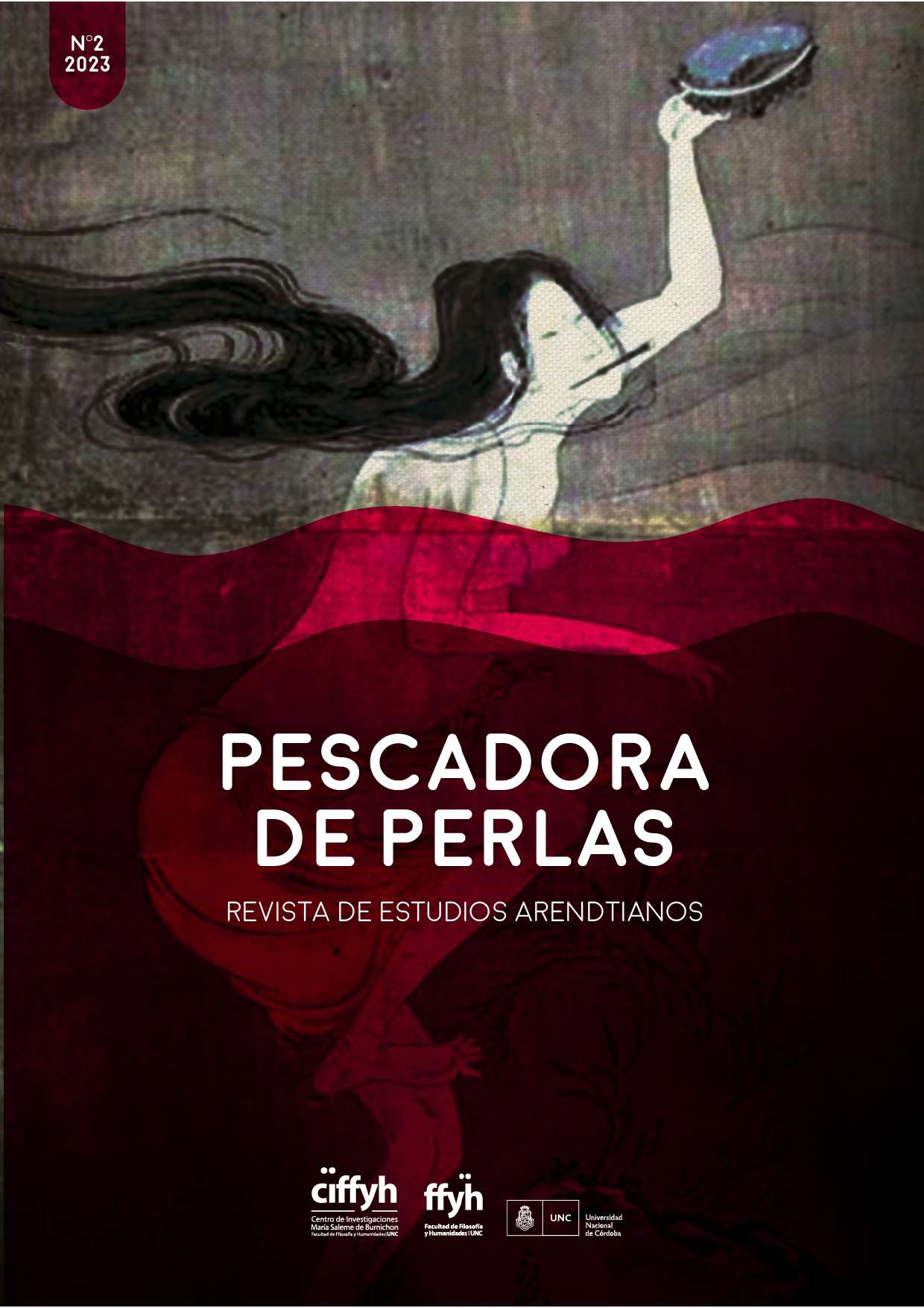Freedom as the meaning of politics: the republican of Hannah Arendt and Alexis de Tocqueville
Keywords:
Arendt, Tocqueville, Freedom, RepublicanismAbstract
This article proposes a dialogue on freedom as the meaning of politics between the Tocqueville of Democracy in America and Hannah Arendt's On Revolution. It proposes to identify certain traits of republicanism in both thinkers of revolution and freedom. Taking into account the ex-post link between this work by Arendt and the revival of republicanism in the 1970s in the heat of historiographical revisionism on the American Revolution, this text is divided into three sections. The first section deals with the status of liberty in Alexis de Tocqueville's opus magnum, emphasizing its relationship with the republic, democracy, and equality. The second section analyzes Arendt's interpretation of the American revolution, based on his definitions of politics, liberty, equality, isonomy, among other central concepts of her work; the objective is to shed light on Tocqueville's influence on Arendt's interpretation of the revolution. The third section reflects on the possibility of thinking of Arendt and Tocqueville as political theorists of republicanism, knowing Arendt's reluctance to be classified in any theoretical current and Tocqueville's classic inscription in democratic liberalism.
References
Abdo Ferez, C. (2021). La libertad. Ed. UNGS.
Arendt, H. (2008). La condición humana. Paidós.
Arendt, H. (2014). Sobre la revolución. Alianza.
Arendt, H. (2009). ¿Qué es la política? Paidós.
Arendt, H. (2018). ¿Qué es la libertad? Entre el pasado y el futuro. Austral.
Arese, L. (2020). República, narración histórica y pensamiento. Hannah Arendt intérprete de la revolución americana. Cuadernos Filosóficos, 17, 1-19.
Arese, L. (2022). Temporalidad política en clave republicana. Una lectura de Hannah Arendt en diálogo con John G. A. Pocock. Anacronismo e Irrupción, 12 (23), 125-158.
Balibar, E. (2017). La igualibertad. Herder.
Bobbio, N. (1989). Liberalismo y democracia. Fondo de Cultura Económica.
Botana, N. (1991). La libertad política y su historia. Sudamericana.
Brunkhorst, H. (2001). Cuestiones públicas: el republicanismo moderno en la obra de Hannah Arendt. Sociológica (47), 45-64.
Cuello, C. (2022). La política y sus escenas en la Argentina del siglo XXI. Cadernos Arendt, 3 (5), 72-88.
Duso, G. (2016). La representación política. UNSAM Edita.
Lamberti, J. C. (2007). “La libertad y las ilusiones individualistas según Tocqueville”. En Roldán, D., Lecturas de Tocqueville (pp. 173-188). Siglo XXI.
Lefort, C. (1986a). “Réversibilité: liberté politique et liberté de l’individu”. Essais sur le politique (pp. 215-236). Seuil.
Lefort, C. (1986b). “De l’égalité à la liberté. Fragments d'interprétation de De la démocratie en Amérique”. Essais sur le politique (pp. 237- 274). Seuil.
Lefort, C. (2007). Focos de republicanismo. En El arte de escribir y lo político. Herder.
Lloyd, M. (1995). In Tocqueville's Shadow: Hannah Arendt's Liberal Republicanism. The Review of Politics, 57 (1), 31-58.
Majul, O. (2022). ¿Cómo estudiar relaciones de influencia en la historia del pensamiento? Dos precauciones. Revista Argentina de Ciencia Política, 1 (28), 222-250.
Morán, S. y Wieczorek, T. (2021). Alberdi lector de Tocqueville, o el liberalismo posible. Teoría y práctica de la política en el siglo XIX argentino. Anacronismo e Irrupción, 11 (21), 48-87.
Pocock, J. G. A. (1972). Virtue and commerce in the Eighteenth Century. The Journal of Interdisciplinary History, 3 (1), 119-134.
Pocock, J.G.A. (2003). El momento maquiavélico. El pensamiento político florentino y la tradición republicana atlántica. Tecnos.
Rinesi, E. (2021). ¡Qué cosa, la cosa pública! Apuntes shakespereanos para una república popular. Ubu Ediciones.
Rodríguez Rial, G. (2022). Tocqueville en el fin del mundo: La Generación de 1837 y la ciencia política argentina. Miño y Dávila.
Rusca, C. (2018, agosto 22). A la sombra de los republicanismos en flor: lecturas de Sobre la revolución. VI Jornadas Internacionales Hannah Arendt. Centro de Investigaciones en Filosofía, Facultad de Humanidades y Ciencias de la Educación, Universidad Nacional de La Plata.
Rusca, C. (2022). De Roma a la Revolución: Una investigación sobre el republicanismo arendtiano. Tesis de Doctorado en Filosofía, Universidad Nacional de Córdoba. Córdoba.
Sertdemir Ozdemir, S. (2013). La liberté politique selon Arendt et Tocqueville. The Tocqueville Review, 34 (1), 193-208.
Smola, J. (2017). Acción e institución en el pensamiento político de Hannah Arendt: lecturas de Sobre la revolución. Estudos Ibero-Americanos, 43 (3), 581-592.
Souroujon, G. (2011). Arendt y las lecturas republicanas de la revolución norteamericana. Fragmentos de filosofía, (9), 13-30.
Tassin, E. (18 de noviembre de 2006). Le peuple ne veut pas [video]. Akadem. https://akadem.org/sommaire/colloques/hannah-arendt-cent-ans-apres-sa-naissance/le-peuple-ne-veut-pas-27-11-2006-6793_4112.php.
Tocqueville, A. de (1996). La democracia en América. Fondo de Cultura Económica.
Downloads
Published
Issue
Section
License
Copyright (c) 2023 Sabrina Morán

This work is licensed under a Creative Commons Attribution-NonCommercial-ShareAlike 4.0 International License.
Consultar los Avisos de derecho de autor. Aquellos autores/as que tengan publicaciones con esta revista, aceptan los términos siguientes:
- Los/as autores/as conservarán sus derechos de autor sobre el texto, y garantizarán a la revista el derecho de primera publicación, el cual estará simultáneamente sujeto a la Licencia de reconocimiento de Creative Commons: Atribución – No Comercial – Compartir Igual (by-nc-sa); no se permite un uso comercial de la obra original ni de las posibles obras derivadas, la distribución de las cuales se debe hacer con una licencia igual a la que regula la obra original.
- Después de la publicación, los trabajos podrán ser reproducidos por los autores en otros medios siempre que no se omita la indicación de la publicación original en esta revista. En este sentido, los autores/as podrán adoptar otros acuerdos de licencia no exclusiva de distribución de la versión de la obra publicada (p. ej.: al depositarla en un archivo institucional o publicarla en un volumen monográfico) siempre que se indique la publicación inicial en Pescadora de Perlas.
- La cesión de derechos de primera publicación de los/as autores otorga a Pescadora de Perlas autorización para que el trabajo sea colocado en el repositorio institucional de la Universidad Nacional de Córdoba y difundido a través de las bases de datos.



